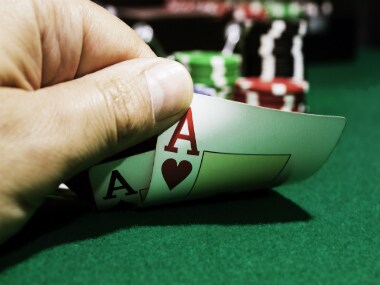In life, you play the cards you’re dealt with. But in teen patti or poker, you have a little wiggle room. That’s what makes Diwali card parties such fun. Talk to any seasoned card player, and they’ll tell you the best players “play the man, not the cards”. Indeed, this is part of the romance of playing cards. [caption id=“attachment_7529371” align=“alignleft” width=“380”]  Representational image. Image source: Getty Images.[/caption] The good news is, you can learn how to read your opponents quickly and scientifically. This Diwali, try these nine tricks backed by psychological sciences:
1. Observe other players before you see your cards
The moment we receive our cards, we want to look at them, hoping for that trail of aces (AAA). Alas, that’s usually not the case. What’s much more useful is to observe how others react when they see their cards. A grimace or a slight smile can reveal a lot about the quality of the cards they’re holding.
2. Keep your ears open
People are having fun, chatting, there is music playing. It’s a party after all! But keep your ears peeled, even if you miss observing others. They might sigh softly or let out a low grunt. Both of which signal their state of mind.
3. Nervousness indicates a strong hand
If you see that a player has suddenly gotten a little nervous after seeing their cards, they are most likely holding very good cards. Most people can’t handle the chance of winning by a wide margin. They get nervous. This is especially true of inexperienced players.
4. Long stare = weak cards
Have you ever seen someone stare longingly at their cards? It’s as if they were trying to will the rags they’re holding to turn into something good. If only our minds could change what we’re holding…
5. Look at how they’ve stacked their chips
It’s not just about the cards. Also, observe how they’ve kept their chips. A solid, experienced player will usually have it in a neat pile. Why? Besides signalling a structured and organised mind, it helps a player quickly check how many chips they have in front of them. And this knowledge is crucial for effective play. All this is too much for a player who is just having fun and doesn’t know much about the game. They will likely have a messy pile.
6. Watch for style
How a person puts the chips down can tell you a lot about them. Players typically have a style, which they’re unable to change - if they’re bluffing, they’ll do it one way; if they have a strong hand, they’ll do it another way. If you can identify each player’s style, you could get a lot of information.
7. Long stare usually means it’s a bluff
Ever noticed someone put in the chips and look away? Do they look super relaxed? This usually happens when they feel they’re in a good position. Conversely, if they’re bluffing, they will stare at you, almost as if trying to intimidate you into folding your hand. Most players don’t realise they’re doing this.
8. Stay observant, even when you’re not in the hand
Say you get cards you don’t want to play. You throw them away and get busy in conversation, or look over at another table to see what’s going on there. What else are you going to do, right? Wrong. Even when you’re not a part of the play, observe your opponents. You can pick up on all the things we’ve been talking about whether or not you’re in the hand. In fact, you’ll probably do it better because you’re not under pressure. And nobody will even suspect you’re looking to pick up cues.
9. Table image, yours and theirs
All the while you’re at the table, keep updating the information you’re collecting about others, and yourself. Put it all together to form everyone’s “table image” - i.e., are they (or you) a careful and calm player? Erratic and aggressive? Or careful but scared to lose? Being aware of everyone’s table image will allow you to tailor your play to best beat their style. Bonus tip: Don’t drink and play cards, if you don’t want to get destroyed at the tables. In the end, don’t forget to have fun! Disclaimer: Information provided here is meant only for recreational games. None of the tips works every time. Each player and game is different. Neither myUpchar nor Firstpost encourages gambling. Gambling addiction is a serious medical condition, which you can read about on myUpchar, India’s first and most credible source of medical information - Gambling Addiction: Symptoms and Treatment_._


)

)
)
)
)
)
)
)
)



